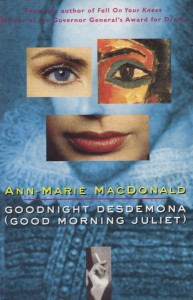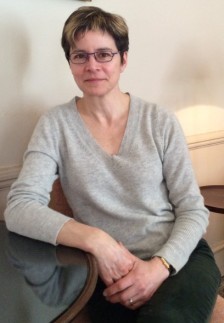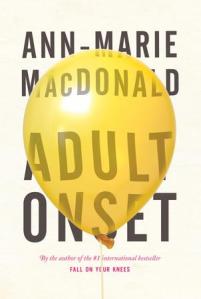Actor and author Ann-Marie MacDonald was in London this week to promote her novel, just released here in England by Sceptre (out in September 2014 in Canada): Adult Onset. Briefly, the main character, Mary Rose MacKinnon is a writer of juvenile fiction who struggles not only to write but to keep herself together while her theatre director wife is away and Mary Rose or MR or Mister is looking after the two children.
MacDonald’s first novel, Fall on Your Knees (Knopf 1996), won the 1997 Commonwealth Writers Prize for Best First Novel and in 2002 was an Oprah’s Book Club selection. Her second, The Way the Crow Flies (2003), was inspired by the Steven Truscott case and her family’s experience of living on RCAF bases. Born in Baden Sölingen, Germany, in 1959, she now lives in Montréal with Alisa Palmer, who is the Artistic Director of the National Theatre School’s English section, and their two children. Shakespeare fans may recognize Ann-Marie MacDonald from her role in Slings and Arrows, or CBC viewers from her role as host of Doc Zone. Check here for some of her many other roles.
We met in a pretty sitting room of Durrants Hotel in Marylebone on Tuesday 10 March soon after Ann-Marie MacDonald arrived in London. She spoke quietly, and was so much at ease that I talked to her as if she were an old friend. Both of us wondered if our paths had crossed in Ottawa or Toronto. (Reading Adult Onset was like rediscovering my old neighbourhoods.) Her calm is particularly striking given that her characters are not: she writes of women in crisis, dealing with abuse or issues from their past that affect their present. Pouring tea, we talked of London and theatre and crowds. We compared the expat life to that of military postings – both share the rhythm of moving every four years or so. As our talk went on, I found that was not the only similarity.
–Debra Martens (interview and photo credit).
DM: My first question is what happened between Baden Sölingen and the National Theatre School [graduating 1980]; I want to know more about your peregrinations after Germany.
AM: Born in Germany, moved to Canada just shy of my fourth birthday. We actually landed in Trenton, so Trenton was the first Canadian soil that I touched. We moved to Centralia, a stone’s throw from Exeter. The second book, The Way the Crow Flies, is set there. That was my first Canadian home. Then we moved to Hamilton, and to Kingston, and then we moved to Ottawa, and from there I moved to Montreal. And went to the National Theatre School. And I basically trace that trajectory in this book.
DM: What made you decide to go to the National Theatre School?
AM: Well it was the best acting training. That was my top choice. I auditioned when I was 17, and then I auditioned again when I was 18 and I got in that time. I think I was too young to go at 17. But it was a good experience. And I spent that year between grade 13 and the National Theatre School at Carleton University, my one and only year of university. That would’ve been 1976/77. It was an important year. I studied languages, literature, classical civilization (survey course). It was fantastic. I loved it. And I loved it because I knew I wasn’t staying. I didn’t expect to make any friends, I didn’t expect to invest at all. In fact, accidentally on purpose I trashed my English exam at Christmas. English was my subject, I was an English star, and it was shocking to me that I’d done that, but I did that. I had to get free.
DM: So it was your year in between?
AM: It was my gap year, which I spent at Carleton, and the most exciting thing, apart from classics and a window onto various European literatures, was being able to skate to school from the National Arts Centre all the way to the Arts Tower.
DM: I did that too.
AM: So we were on the canal at the same time definitely.
DM: The skating was amazing. It hasn’t been that cold….
AM: This year was incredibly cold, the first time in ages. I went to Colonel By Secondary School in Ottawa. I think I was in the first graduating class. It was a brand new open concept school. Gradually they just added wall after wall because you can’t learn that way, with no walls. Very progressive 60s thinking went into this school — it was very cutting edge, very forward looking. Instead of a bell ringing we had chimes. I started in fall of 1970 and graduated in 1976. So those were my adolescent years, in Ottawa.
I never went anywhere or did anything. I never went drinking at the Maple Leaf Tavern — that was the one place to go, everybody did that. I did not do any of those things. I sat on the living room floor in either my house or my best friend’s house – we met when I was 12 and she was 13 – and we listened to Bruce Cockburn and Joni Mitchell and the Beatles’ White Album and we talked about existence, is there such a thing, what confers identity, and when I casually toss around the pronoun “I” what does that even mean, are we all simply prisoners behind our skulls, and boys, and our friends, and the world, and books and on and on. We listened to these records over and over again and we talked and talked and talked. She’s now a poet—Nadine McInnis, she’s brilliant.
DM: I think it is interesting that you talked about identity at that age because I think it’s a question that expats think about a lot.
AM: Oh, I should think so.
DM: You get up and you leave behind everything and start afresh, start anew. Are you the same person when you do that, and when you keep doing that?
AM: Yeah. It’s hard to do that. In many ways I wouldn’t trade it but I don’t think I understood the cost of it until I was well into my adulthood. I don’t think I really understood what all this means, the disruption, the discontinuity of identity. It develops talents and deficits and patterns that are very hard to even recognize for what they are, never mind to change. There’s the sense that you are always going to be abandoning whatever it is that you take on. You invest fully, heavily, wholeheartedly, with the knowledge that it’s all going to be crashed and burned. Bye bye. On to the next. And I’ve often wondered if that had informed my own genre hopping. My own sense of, Well I’ll do this for a while, and I’ll do this as hard as I can, and then stop, and do something else. Then run out of something elses.
Having just moved from Toronto to Montreal, very recently… I’d put down major roots in Toronto. I’m from Toronto now: I lived there for 34 years. I know a lot of people, and a lot of people know me, not just because I have a public profile there, but because I lived there, I know people just because I know them, just because they’re in my neighbourhood. I never had that growing up and I really value and love that.
And Montreal is great. That’s like our foreign posting without actually having to leave the country. My wife is the artistic director of the National Theatre School. And I think, Oh God, have I just turned into my mother? I’m an air force wife, how did this happen, how? Wait a second. It all depends on how you read the story, how you frame it, that’s one way of framing it – I’m following someone who’s been posted to a foreign place. And that said, we’re really lucky to be there, we’ve often said, Wouldn’t it be great to live in Montreal for a few years, great for the kids to become bilingual and all of that. So that’s happening. But it was hard for me to move, especially having moved around as a kid. It rekindled some of that stuff. Dragging me out of here kicking and screaming even though I more than signed on for it. It’ll be fantastic, yes, let’s do this, all of which is true, but it didn’t make it easy.
DM: You said that moving around a lot gives you deficits and strengths. Is adaptability one of your strengths?
AM: Yes I would say so. Definitely. Adaptability, I always assumed, was the same as resilience but I don’t think it is. I think that’s something else. You could be endlessly adaptable but you actually have to feed on something, you have to be able to encounter challenges and get your shape back rather than continuously shape shifting, which is a kind of extreme adaptability.
DM: One of the things I noticed in The Way the Crow Flies is how Madeleine McCarthy is constantly flipping between Germany and Canada, how she makes references and uses German words. Did you arrive with German when you came back or did you have to go and look things up?
AM: I studied German for five years; four years in high school and then one year at Carleton. That said, it wasn’t hard. And then decades later, it crossed my mind, well we had a German babysitter and we did live in a German town, and that was the pre-verbal to verbal time when you’re soaking it all up. I’ve always loved the sound of the German language even though I’m of the generation that grew up with, you know, the Nazis portrayed on television and Hogan’s Heroes and all the rest of it, the barking awful sound of German. But for me the sound of German was always a woman’s voice: beautiful and caressing and gentle. That’s a funny duality. I have fond associations with German. That nice juxtaposition is one of the ingredients for making a kid into a writer. Those sharp contrasts, paradoxes.
DM: I was going to ask you if there exists a word in German that doesn’t exist in English or can’t be better said than the original in German.
AM: I used one of them in Adult Onset: Gemütlichkeit
DM: Which is exactly the one that I would choose as well. [Loosely defined, Gemütlichkeit is a situation or atmosphere that blends cozy, comfortable, friendly, a sense of belonging and ease.]
AM: That is the one.
DM: How did you go from acting to fiction?
AM: I started doing collective creations, which a lot of Canadian actors do. Now the younger writers call them devised pieces, but it’s all the same thing: create a piece of theatre with other actors and perform it. So that was a natural evolution. I went from doing collective creations to collaborating on a script with one other person and also performing in it, to writing Goodnight Desdemona (Good Morning Juliet), which was the first play that I wrote in which I did not perform. Well I did eventually but not for years. [written in 1988, performed in 2001: source.] I continued working in all those modes. It’s not like one led to the other and I never did it again. Because they all fed each other. But that’s how that happened. I wrote a couple of plays and then I started what I thought was another play and it turned out to be Fall On Your Knees. I really did think I was writing a play and the stage directions were out of control. Until I realized to my horror that it was really prose fiction.
DM: Were you scared?
AM: I was.
DM: I notice you have this technique of cutting between past and present, of dropping in text from the past into the present text. I was wondering if you had anything to say about how the novel has changed. If this technique is a contemporary technique or is one that is trying to deliver the text to readers who are more fragmented in their reading.
AM: Or maybe it’s just because this is a fragmented psyche.
DM: Ah, that’s a very good answer, yes.
AM: I think we’ve grown accustomed to that kind of fragmentation. We’ve made a virtue of it and a style of it, etc., in our culture, but I think it costs us a lot too. It goes back to the discontinuity of identity.
DM: I wanted to ask if your theatre and film experience affect your fiction.
AM: Yes, definitely. It’s all storytelling.
DM: Does it help with narrative?
AM: Yes, it helps with narrative, it helps me always come back to what’s happening, what’s changed, what’s different at the end of this page. How has the world changed in the course of this sentence, this chapter, why does this have to be here?
DM: One of the things I especially loved about your book was the dark humour. And so I just want to confirm that it was in fact meant to be funny. For example, when she is looking up about the bone cysts and finally works out the reverse causal effect and it’s from a vet website. So she finds out the truth about herself by reading about dogs. Which I find very funny. Is it meant to be funny?
AM: Yes, well it’s ironic and it should be funny. It should be the kind of funny that results from recognition. That’s how things happen, that’s how profound important things happen, it’s almost a joke, you cry or you laugh.
Related
- MacDonald reads from Adult Onset on CJSW Writer’s Block podcast: (soundcloud.com)
- Long profile on kickasscanadians.ca
- Montreal Gazette interview: (montrealgazette.com)
- Ottawa Citizen interview: (ottawacitizen.com)
- Profile/interview in National Post: (news.nationalpost.com/2014)
- Guardian review of The Way the Crow Flies: (theguardian.com/books/2003)
- New York Times review of The Way the Crow Flies, “Canada’s Cold War”: (nytimes.com/2003)


I felt like I was there, eavesdropping! Really interesting reading, Debra. Thank you.
LikeLike
A quality interview, Debra; the kind that deserves to be published in national newspapers. Well done!
LikeLike
Thanks!
LikeLike
Interesting interview, Debra. Did you mention that you too know Nadine McInnis? Thanks.
LikeLike
Thanks, Bonnie. Yes, indeed I did talk about Nadine and the writing group. In fact, I interrupted Ann-Marie with “No way” and “Seriously?!” when she named her poet best friend. But the interview was not about me, and needed shortening….
LikeLike